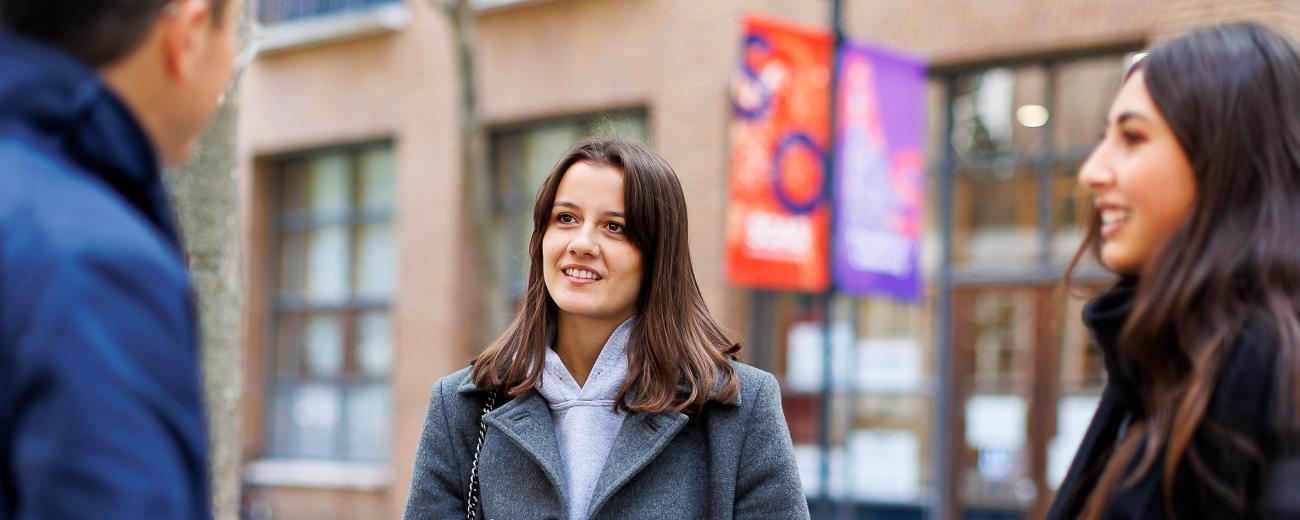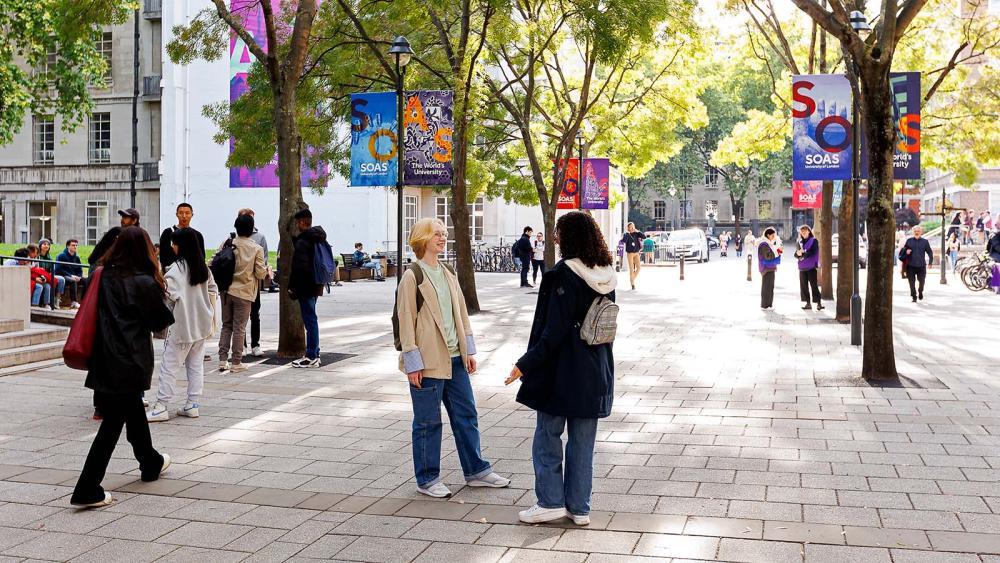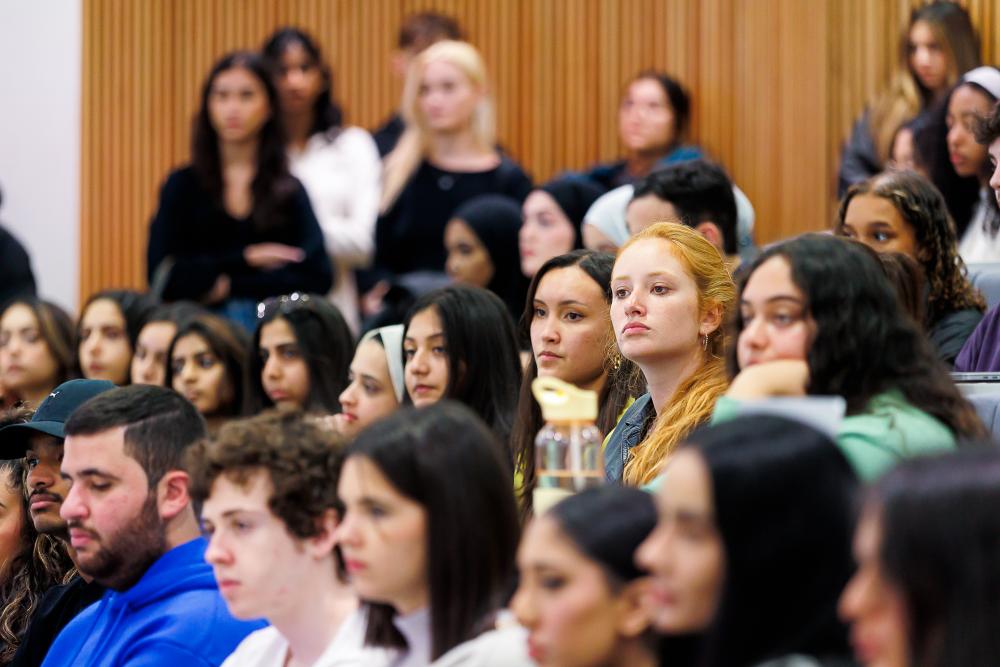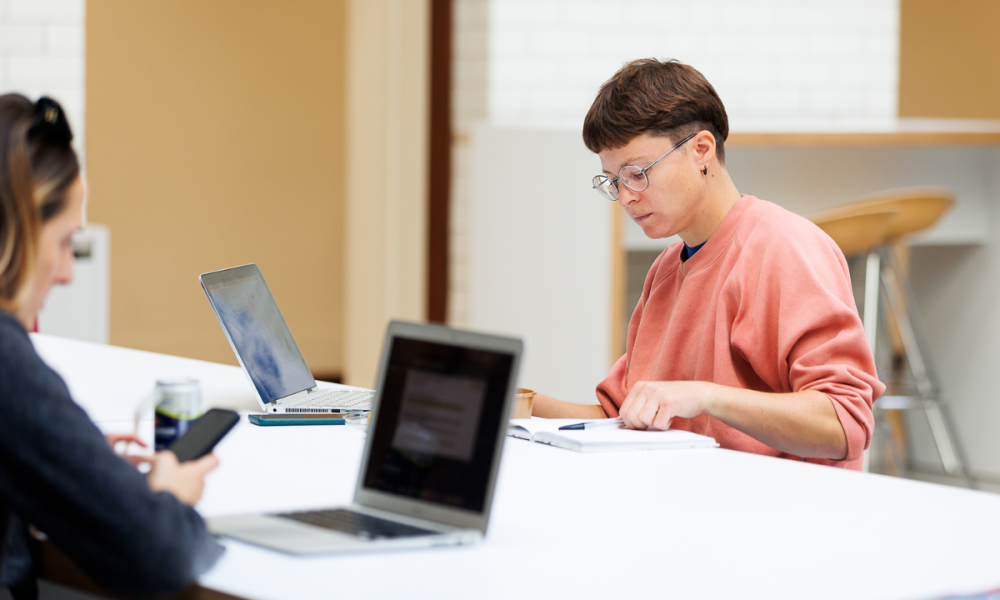How my time at SOAS forced me to be uncomfortable (and how I grew from it)


I am only one month away from the end of my undergraduate studies at SOAS – 3 years spent in London and a Language Year Abroad in Taiwan – and my introspection cogs have been turning. What have I gained from this experience? How have I changed as a person? All dots connected when I realised that the sources of my growth converge into a series of uncomfortable intellectual and emotional discoveries stemming directly from SOAS’ unique student body, academic approach and global partnerships.
1. You have to experience feeling different and out of place to gain intercultural intelligence
SOAS’ network of global partnerships provides plenty of such opportunities. My degree course, BSc International Management for China, includes a compulsory Year Abroad studying Mandarin Chinese, which I spent at National Taiwan Normal University in Taipei, Taiwan. During my Year Abroad, I left multicultural London for my first long-term living experience outside of Europe. Taiwan is more homogeneous, so I was bound to stick out and experience the struggles of integrating myself into society. I felt lonely at first, and so did some of my coursemates – those who grew up monolingual had never experienced that feeling of inadequacy in being unable to express themselves in another language (a stark reminder of the ‘language crisis’ in the UK, the percentage of Britons speaking more than one language being significantly below the rest of Europe. SOAS luckily remains a stronghold for language teaching, with many degree courses offering languages and a Year Abroad option).
In hindsight, I learnt a lot from my initial Year Abroad struggles: empathy, interpersonal skills, intercultural skills, communication, being proactive and problem-solving. Now, whenever I encounter a cultural difference, my first reaction is to register it as it is, judgement-free.
2. Your bubble is bound to be burst at some point
The SOAS student body is often and rightly portrayed as being very cohesive and politically engaged. However, there are plenty of alternative voices that make themselves heard outside of the SU channels. My bubble was burst during a Corporate Governance tutorial focused on gender diversity on corporate boards. During the discussion section, one of the tutorial participants expressed that, according to their interpretation of some religious writing, women are unsuitable to hold positions of authority. After the initial shock (being a woman graduating in Management myself), I reflected that there must be many other people sharing similar beliefs scattered across the world outside of my social bubble. I already knew this on an intellectual level, but to hear it first-hand was a bucket of ice water that also increased my appreciation of academic freedom at SOAS. Get ready for uncomfortable conversations and gain a different sense of what’s out there – including people that think differently from you!
3. Other people’s starting points in society are wildly different
We tend to grow up in communities where everyone shares similar backgrounds. At SOAS, which has a very diverse student body (more than half are international students), I had the chance to meet people from all cultures and countries, from the A to Z of the alphabet. What I was not prepared for was the class differences subsisting between us. For every student recruited under Widening Participation programmes, there was another student who had grown up following their parents’ international careers – born-in-Dubai, grew-up-in-China, lived-in-France, has-dual-citizenship kind of student. This was mind-blowing for someone like me, whose parents have been settled in the same mid-sized Italian city doing the same clerical job for decades.
At SOAS, I also learned about different UK programmes aimed at social mobility or bridging the gap between school and work. In my first weeks at SOAS in 2018, I applied to join the student-run SOAS branch of TEDx, the famous idea incubator platform hosting live talks and conferences. I miserably failed my interview. I had nothing to back up my interest in innovation, public speaking and philosophy, given that Italian state schools discourage students from doing anything that could take time away from memorising textbooks and achieving high marks. The average Italian high school student does not do volunteering nor has a part-time job. By contrast, all the British students I met at SOAS had been in employment of some kind since they were in sixth form, with many companies offering insight programmes and youth schemes.
I remember feeling angry about the competitive advantage of my peers. In the end, I slowly came to terms with it and I am actually proud of the effort I made in catching up with their cultural capital. It made me hungry for knowledge and eager to carve out a space for myself in this competitive world. I thank SOAS for exposing me to all kinds of social backgrounds and thus equipping me with the tools to interact with a wider range of people and lighting that fire in me.
4. You cannot be liked by everyone, and you cannot do everything either. In other words, you cannot control everything
Courtesy of FOMO (Fear of Missing Out) – a peculiar Generation Z struggle – we are affected by social media, and we feel we have to be liked at all costs, putting on display a curated image of ourselves and always planning the next thing to be able to say: “I was there!”. Talking to my peers, it’s an overwhelmingly common issue. At university, the magnitude of this phenomenon increases tenfold, with so much going on all the time. The SOAS Students’ Union is known to be one of the most vibrant in the UK, and there are plenty of paid and volunteering opportunities to get involved in the operations of SOAS – I have been a society president and committee member, a pro-bono consultant with the SOAS branch of 180 Degrees Consulting, a Student Rep, a Peer Mentor, a Careers Ambassador, a Campus Ambassador and a Digital Ambassador. Sounds like a lot? Indeed, there was a moment in my third year while writing my dissertation when I felt so overwhelmed that I realised I had taken up too many responsibilities. I needed to take a step back, identify my priorities, and, frankly, also enjoy university life along the way. It was an enlightening moment that made me realise I don’t have to be doing everything all at once.
Similarly, I also realised I cannot be liked by everyone. I loved my time in Dinwiddy House, one of the two SOAS-only student accommodations located in King’s Cross (the other one being postgraduate-only Paul Robeson House). I had a cosy ensuite with a communal kitchen shared between 6 flatmates. We never really clicked, and that’s okay. I also did not form a big friend group, and that’s okay, too. Instead, I was lucky to meet other amazing and stimulating friends I hung out with on a mostly 1-to-1 basis.
The pandemic then came to deliver one final lesson on the topic of control. I ended up being stuck in that same cosy room that once marked the beginning of my journey. I calculated that, in 2020, I did not see a single human being for more than 100 days, as I was scared to even walk down the flat corridor leading down to the kitchen. To deal with the financial impact of the pandemic, my degree course had to be withdrawn (meaning that it is not available for future students anymore); at the same time, I am extremely grateful for everything that SOAS did to allow me to complete my studies. My department (the School of Finance and Management) allowed me to move my Year Abroad to my final year in the hope that China or Taiwan’s borders would be open by then. The SOAS Advice and Wellbeing team supported me in applying for a one-year Leave of Absence (again, because I wanted to buy time in the hopes of attending my Year Abroad in person). In 2020, I was hopeless with everything spiralling out of control around me. It was a tough lesson, and I learnt to cope with uncertainty and the inability to plan ahead until it was clear that Taiwanese borders would re-open to international students. And it did work out! Whilst I hope that I won’t have to deal with anything like this again, I learnt that you have to focus on what you can control, rather than stress over what you cannot control.
5. You only get what you put in
As England’s university fee cap rose to £9000 in 2012, universities started being understood as a service provider, with students being the customers. This led to an expectation among many students to be hand-held by their home institutions. The reality is that university is a place to learn independence and accountability. After entering the academic world, you quickly realise how much of it is self-managed and fruit of your own work, especially in light of plagiarism regulations (meaning you cannot really have someone helping you write essays). Although SOAS offers assignment feedback services like Studiosity (accessible via the Bloomsbury Learning Environment, BLE), academic essay writing modules and pre-sessional English courses for international students, the quality of your output will almost entirely depend on how much thought you put in it and how well-organised the research and writing process was.
This is also great prep for the world of work, where you will be expected to grasp concepts quickly and complete the share of your work in a timely manner without over-relying on your busy supervisors.
What a journey studying at SOAS was. This was only a fraction of what I learnt at this special institution that became an inseparable part of my identity. Ultimately, university is not just about getting a qualification, but also about personal growth, discovering your priorities and learning how to navigate society. I hope my confessions as a final year gave you an insight on the dynamic thinking that characterises SOAS students – cheers to the 2023 graduating cohort!
About the author
Eleonora is a SOAS Digital Ambassador and final year BSc International Management for China student currently on her Language Year Abroad in Taiwan. She is passionate about and has previously worked in Professional Services in Higher Education. She likes craft beer, reading non-fiction and Chinese drill music. Preferably all at once.





